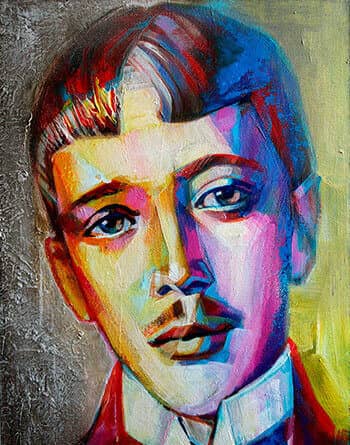- Язык:
Английский (English)
- Автор:
Бартон Раффел(Burton Raffel) , Алла Бураго(Alla Burago)
- Источник:
Selected works of Nikolai S. Gumilev
The Muzhik
near a tin river,
in shaggy log cabins, dark, dark,
there are strange muzhiks.*
Sometimes one comes out, there where no roads go
where feather-grass* scatters,
and he listens to Stribog* scream, and
he senses an old story, a true story.
A Pecheneg* came through here, once,
staring straight ahead...
It smells of snakes, of must and mist,
down near the emptying rivers.
There he is, carrying his pack,
filling the forest trail
with a long, drawn-out song, a soft song,
but a sly song, oh a wicked song.
This trail is — light and darkness,
a thief whistling in fields,
arguments, bloody quarrels
in inns as frightening as dreams.
He comes — God help us! —
to our proud capital.
He enchants the empress
of endless Russia
With his eyes, his childlike smile,
his sly talk —
and a gold cross glows
on his brave chest.
Why didn’t the cross on the church
of Kazan,* and Saint Isaac’s* cross,
why didn’t they — oh Christ our Lord! —
why didn’t they bend, and descend?
Shots and shouts across the shaken
capital, bells, alarms;
the city bares its teeth like a lioness
protecting her cubs.
“Well, go on, you holy ones, burn
my corpse on the dark bridge,
throw my ashes to the wind...
Who’ll defend an orphan?
“In a wild, poor country
there are lots of strange muzhiks.
You can hear their joyful feet rumbling
along your roads, along your roads...”
* A muzhik, (pronounced moo-ZHEEK) is a Russian peasant This poem is about Rasputin. Feather-grass, Stribog (the ancient Slavic pagan god of the winds), and Pecheneg (a nomadic Turkic people of the central Asian plain, sometimes called Polovtsy) are allusions to the twelfth-century Tale of Igor's Men and are therefore redolent of ancient Rus, of the disastrous history of old Russia. Saint Isaac's and Kazan Cathedral are the two largest and most prominent churches in Saint Petersburg. — Ed.
Перевод стихотворения Николая Гумилёва «Мужик» на английский язык.
Мужик
В чащах, в болотах огромных,
У оловянной реки,
В срубах мохнатых и темных
Странные есть мужики.
Выйдет такой в бездорожье,
Где разбежался ковыль,
Слушает крики Стрибожьи,
Чуя старинную быль.
С остановившимся взглядом
Здесь проходил печенег…
Сыростью пахнет и гадом
Возле мелеющих рек.
Вот уже он и с котомкой,
Путь оглашая лесной
Песней протяжной, негромкой,
Но озорной, озорной.
Путь этот — светы и мраки,
Посвист, разбойный в полях,
Ссоры, кровавые драки
В страшных, как сны, кабаках.
В гордую нашу столицу
Входит он — Боже, спаси! —
Обворожает царицу
Необозримой Руси
Взглядом, улыбкою детской,
Речью такой озорной, —
И на груди молодецкой
Крест просиял золотой.
Как не погнулись — о, горе! —
Как не покинули мест
Крест на Казанском соборе
И на Исакии крест?
Над потрясенной столицей
Выстрелы, крики, набат;
Город ощерился львицей,
Обороняющей львят.
— «Что ж, православные, жгите
Труп мой на темном мосту,
Пепел по ветру пустите…
Кто защитит сироту?
В диком краю и убогом
Много таких мужиков.
Слышен по вашим дорогам
Радостный гул их шагов».
Другие переводы:
- Английский
Гарри Виллеттс
The Peasant - Болгарский
Бойко Ламбовски
Мужик - Венгерский
Иштван Бака
Muzsik - Китайский
Чжэншуо Чжан
庄稼汉 - Чешский
Мария Марчанова
Muzik
